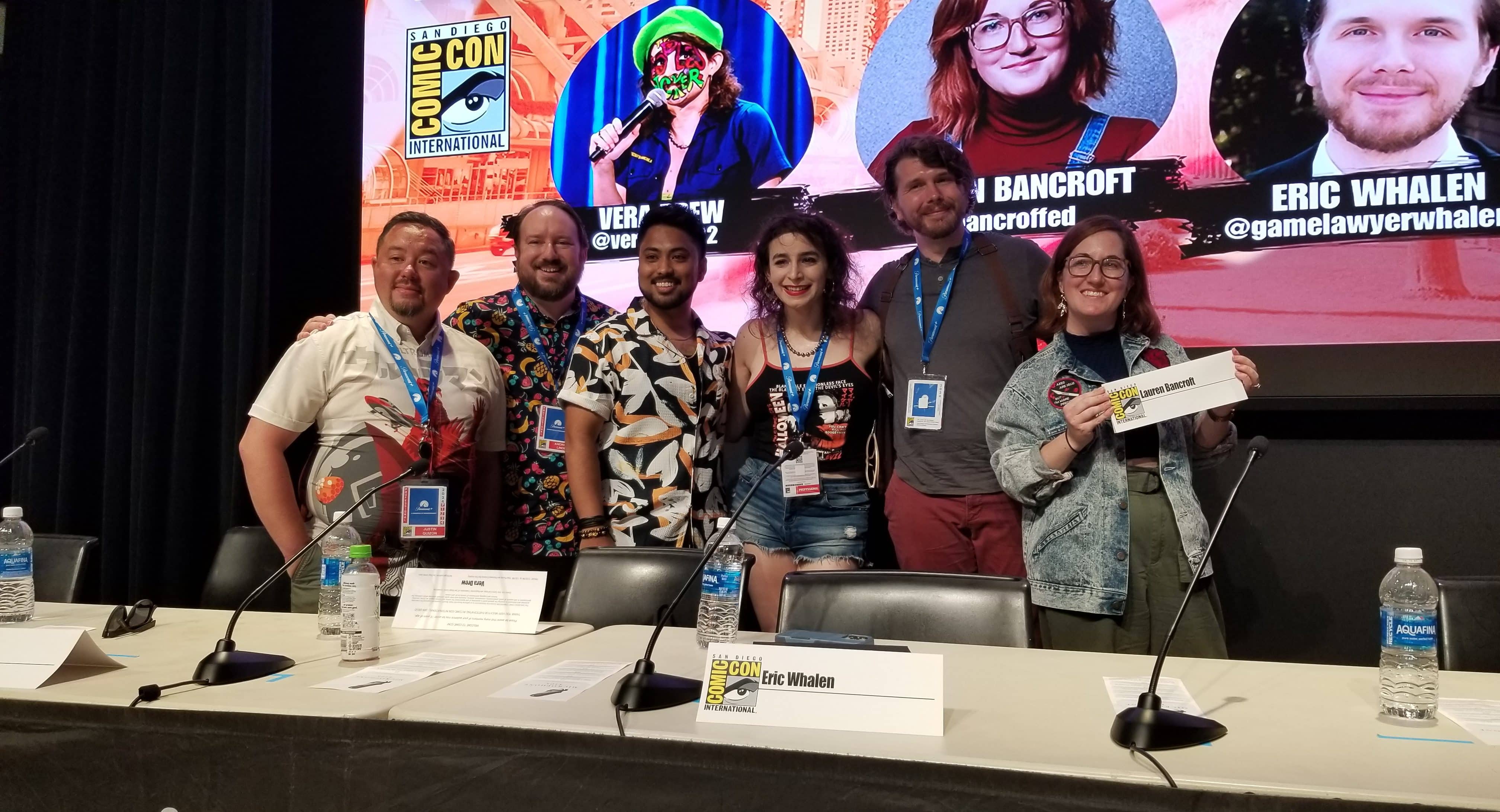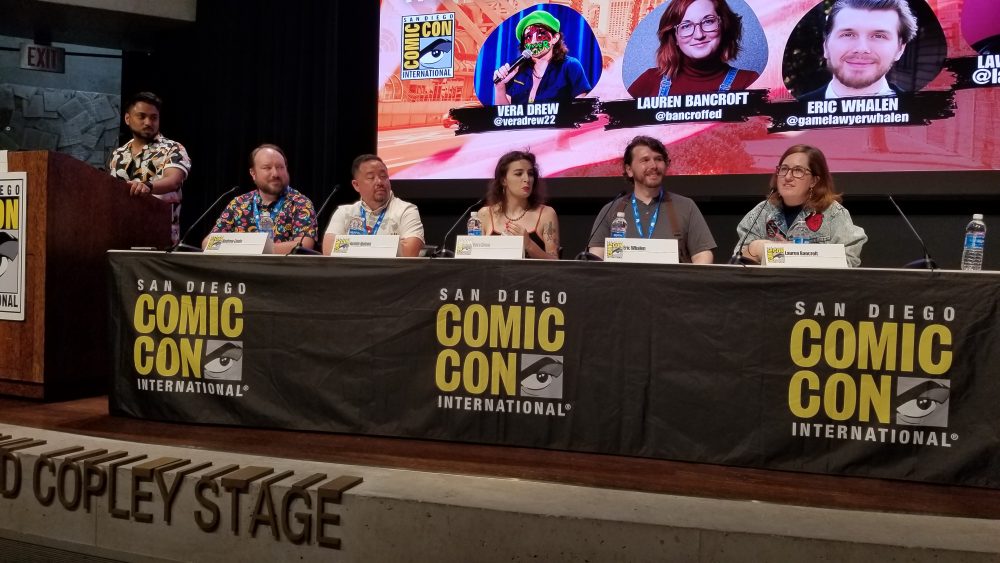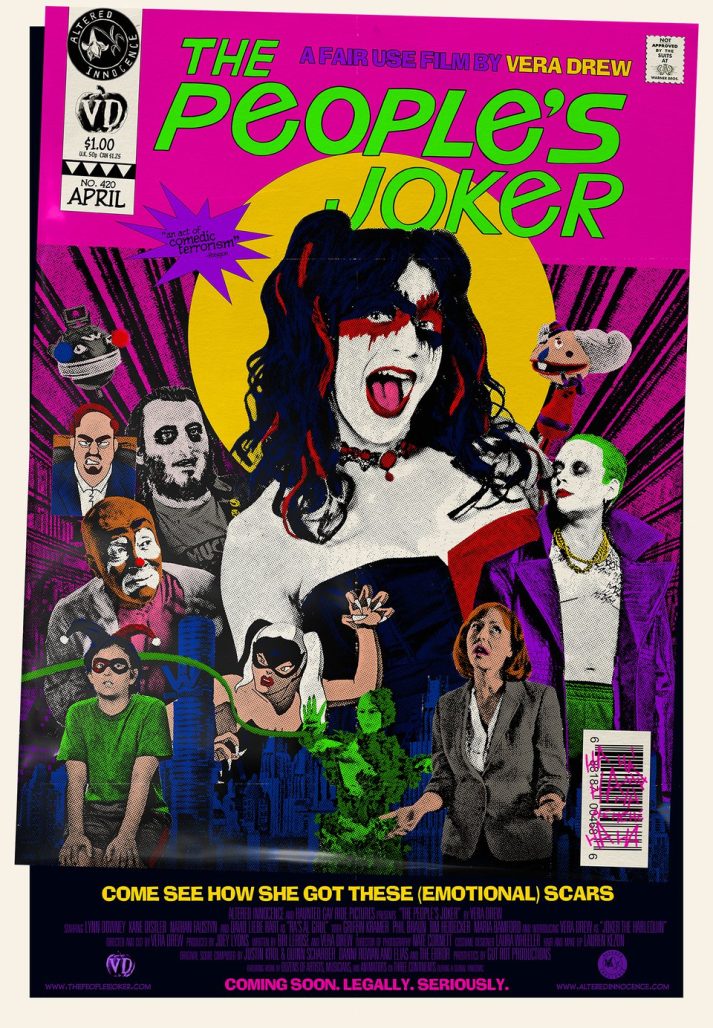By Gabriel Neeb
Before I go further into the panel “How Parodies and Remakes Enhance the Film Industry” help at the Neil Morgan Auditorium in San Diego’s Main Library Branch on July 26, 2024, I would like to stress that for all the legal issues and advice discussed at this panel, anyone with legal questions or concerns should consult legal counsel before proceeding in whatever endeavor they have in mind. Nothing in this article should be considered legal advice or guidance.
That said, what happens when podcasters, filmmakers, and a lawyer get together at the San Diego Comic-Con to talk about parodies and their legal implications? Driven primarily by the team at the Nothing New Podcast talents Andrew Linde (Nothing New), Justin Quizon (Nothing New), Vera Drew (PEOPLE’S JOKER), attorney Eric Whalen, producer Lauren Bancroft were led by moderator Lawrence Sharma in a discussion about parodies, remakes, and legal implications.
The panel began with a question about why make a parody in the first place. Linde started by saying that good parodies can point out flaws in the inspiring work, and used the TOP GUN inspired HOT SHOTS! as an example of parody being funny, and a way to highlight aspects of an original.
The question of ‘parody vs satire’ arose and here, the legal matters started to enter the conversation. Eric, as the trained legal mind, stated that “authorial intent” is often at the heart of this question and that the four factors of transformative use often arise when the issue is considered in the courts.
Vera, who gained notoriety and acclaim (depending on whether or not you work for Warner-Discovery or not), then spoke about how she made the autobiographical transgender narrative film THE PEOPLE’S JOKER. She’d grown up on the films of Mel Brooks and was inspired by his parodies of traditional genre narratives.
Lauren, who’d worked on DOCTOR WHO inspired sketch comedies said about her ideas, “…if it’s the dumbest thing I’ve ever done… It’s a great idea.”
Vera did interject as, when she did seek legal counsel when making her film (which is heavily informed by assorted Batman comics and films), she was advised not to speak of her love of the Batman mythos even though the movie is from a place of love. She was also aware of how possessive angry white men are of the Joker (the audience responded to this with nervous laughter).
Eric then asked that everyone on the panel and the audience be aware of the differences between parody and remake: remake being the one that secures license from the original work’s rights holder. A red flag to be weary of, is to ask how much will a work rely on merchandising.
The panel circled back to another popular parody: AUSTIN POWERS: INTERNATIONAL MAN OF MYSTERY. What was interesting about that work, is that is raised the concept of a villain ‘monologing’ a little before the inspiring work of the James Bond franchise… featured a villain monologuing in TOMORROW NEVER DIES!
The topic of Fair Use emerged. Vera used the concept to get her film made and noted that Fair Use is the same principle documentary filmmakers use. She offered the documentary ROOM 237 (about Stanley Kubrick’s THE SHINING) as an example. THE PEOPLE’S JOKER was technically fiction but autobiographical- she did state she hadn’t killed Batman. Yet.
Fair Use led to a further discussion on the Four Factors of Transformative Use with Eric being asked to describe them. Eric, as a good attorney, looked them up. Lauren then noted she’s been heavily involved in figuring the topic out because she’s working on a documentary about DOCTOR WHO fandom and one of the many issues is figuring out what she can use.
“I love lawyers.” Vera made extensive use when Warner-Discovery tried to stop the release of THE PEOPLE’S JOKER through cease-and-desist orders. They didn’t want the issue to end up in courts as it was possible legal precedents could have been established during potential litigation.
There was an example of a failed case of Fair Use where one creator tries to publish a Dr. Suess style parody book about the OJ Simpson case. Those creators’ main fault being that they tried to capitalize on the Suess brand and the estate successfully stopped further publication. Then the cases of the “30 second rule” came up where, supposedly 30 seconds can be used without penalty. Eric shot down this idea and cited a case where a news station had to pay because they didn’t secure the license permission from the original creator.
The biggest red flags had to be “don’t do a parody of something no one will enjoy.” Justin said a parody should have an audience. Lauren suggested that a PRINCESS BRIDE remake wouldn’t be welcome.
For Vera, she used interaction with fellow artists online to prove and audience existed for THE PEOPLE’S JOKER, fully aware of how toxic elements of DC fandom could be.
“Was there a backup plan?”
Vera: “No!”
The film was conceived during COVID and it became her “drive” in this period. And to get it made… she said it “helped being a bit of a bimbo.” to which Eric said that wasn’t a good defense and that penalties for infringement start at $150,000 US.
The moderator asked what her biggest takeaway was from the making of the film.
“Auteur Theory is BS.” It’s impossible to make a film alone and one needs to be surrounded by friends with A LOT of goodwill.
When the moderator asked what parodies had been done well, Linde offered YOUR HIGHNESS as an example. Justin suggested GALAXY QUEST, Eric suggested ROBIN HOOD: MEN IN TIGHTS, and the most controversial answer came from Lauren: “SPACEBALLS.”
The moderator, mindful of time, asked what the future might hold. Vera has plans for a sequel to THE PEOPLE’S JOKER: FREDDY VS THE PEOPLE’S JOKER.
Justin said he’s hoping a GODZILLA parody someday emerges from Japan and Linde has said that “multiverse” movies could use a parody, though some thinK EVERYTHING EVERYWHERE ALL AT ONCE serves as a parody of that genre already.
Instgrams:
Linde: podcasterandrew
Justin: justinquiz
Vera: veradrew22
Eric: gamelawyerwhalen
Lauren: bancrofted
THE PEOPLE’S JOKER is available on VOD and is currently touring cinemas all over the world. A bluray and pan-and-scanned VHS are planned to be released from Altered Innocence.
Stay tuned for more SDCC ’24 coverage from The Beat.













